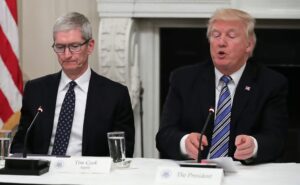|
Getting your Trinity Audio player ready...
|
Apple stock is experiencing a major downside after US President Trump threatened a 25% tariff on iPhones not manufactured in the United States, reigniting concerns about trade tensions.
In a post on Truth Social, Trump stated, “I have long ago informed Tim Cook of Apple that I expect their iPhones that will be sold in the United States of America will be manufactured and built in the United States, not India, or anyplace else.” He added that failure to comply would result in Apple paying a tariff of “at least 25%” to the U.S. government.
The tariff threat comes as Apple continues to diversify its global supply chain, moving production to India amid geopolitical risks and rising labor costs in China. According to Apple CEO Tim Cook, “the majority of iPhones sold in the US will have India as their country of origin.”
Apple Faces Mounting Political and Economic Pressure
Apple, the world’s most valuable company with a market cap exceeding $2.8 trillion, has long argued that U.S. manufacturing is not viable for its products due to a lack of skilled labor and high production costs. Analysts at Wedbush Securities estimate that roughly 90% of Apple’s iPhone production is still based in China.
Trump’s renewed pressure follows his meeting with Cook during his Middle East tour, where he publicly criticized Apple’s expansion in India. “I said to him, ‘Tim, you’re my friend… But now I hear you’re building all over India. I don’t want you building in India,’” Trump said during a stop in Qatar.
While Apple did not respond to requests for comment, sources confirm that Cook met with Trump at the White House earlier this week. The nature of their conversation remains undisclosed.
A Reality Check on U.S. iPhone Manufacturing
Despite Trump’s push, experts remain skeptical about the feasibility of moving iPhone production stateside. Dan Ives, Global Head of Technology Research at Wedbush Securities, dismissed the idea as a “fictional tale.”
“You build that supply chain in the U.S. with a fab in West Virginia and New Jersey, they’ll be $3,500 iPhones,” Ives told CNN, citing the complexity and cost of replicating Asia’s robust electronics manufacturing ecosystem. He added it would cost Apple around $30 billion and three years just to move 10% of its supply chain to the U.S.
This isn’t the first time Apple has faced political scrutiny over its offshore manufacturing. In 2010, late Apple co-founder Steve Jobs told President Barack Obama that the U.S. lacked the necessary skilled industrial engineers to support Apple’s manufacturing needs. Tim Cook has echoed similar sentiments since taking the helm.
Apple’s $500 Billion U.S. Investment
To ease political tensions and bolster its domestic presence, Apple recently announced a $500 billion investment to expand its U.S. operations. The investment includes:
- A new server production facility in Houston to support Apple Intelligence, the company’s new AI product line.
- Expanded data center capacity in multiple states.
- Increased funding for Apple TV+ content production across 20 states.
While this move may signal Apple’s intent to strengthen its U.S. footprint, the reality of iPhone manufacturing remains tied to Asia’s highly specialized supply chain.
Market Implications and Stock Movement
The tariff threat introduces new volatility for Apple stock (AAPL). Although the company recently dodged a more damaging tariff hike on Chinese electronics, it remains vulnerable to broader trade policy shifts.
Apple’s stock price has shown resilience in 2024, but analysts warn that prolonged tariff battles could dent investor confidence, particularly as Apple enters a crucial phase of launching AI-powered devices and services.
The Bigger Picture: Tariffs, Trade, and Tech
Trump’s latest remarks underscore the intersection of politics, tech, and global trade. His “America First” stance on manufacturing continues to clash with the economic realities faced by companies like Apple, which depend on global supply chains to maintain profitability.
As election season heats up, and with renewed scrutiny on tech regulation, truth social, and foreign trade, Apple could remain in the political crosshairs. Whether or not tariffs are enforced, the public pressure may shape how the tech giant navigates future supply chain decisions.

